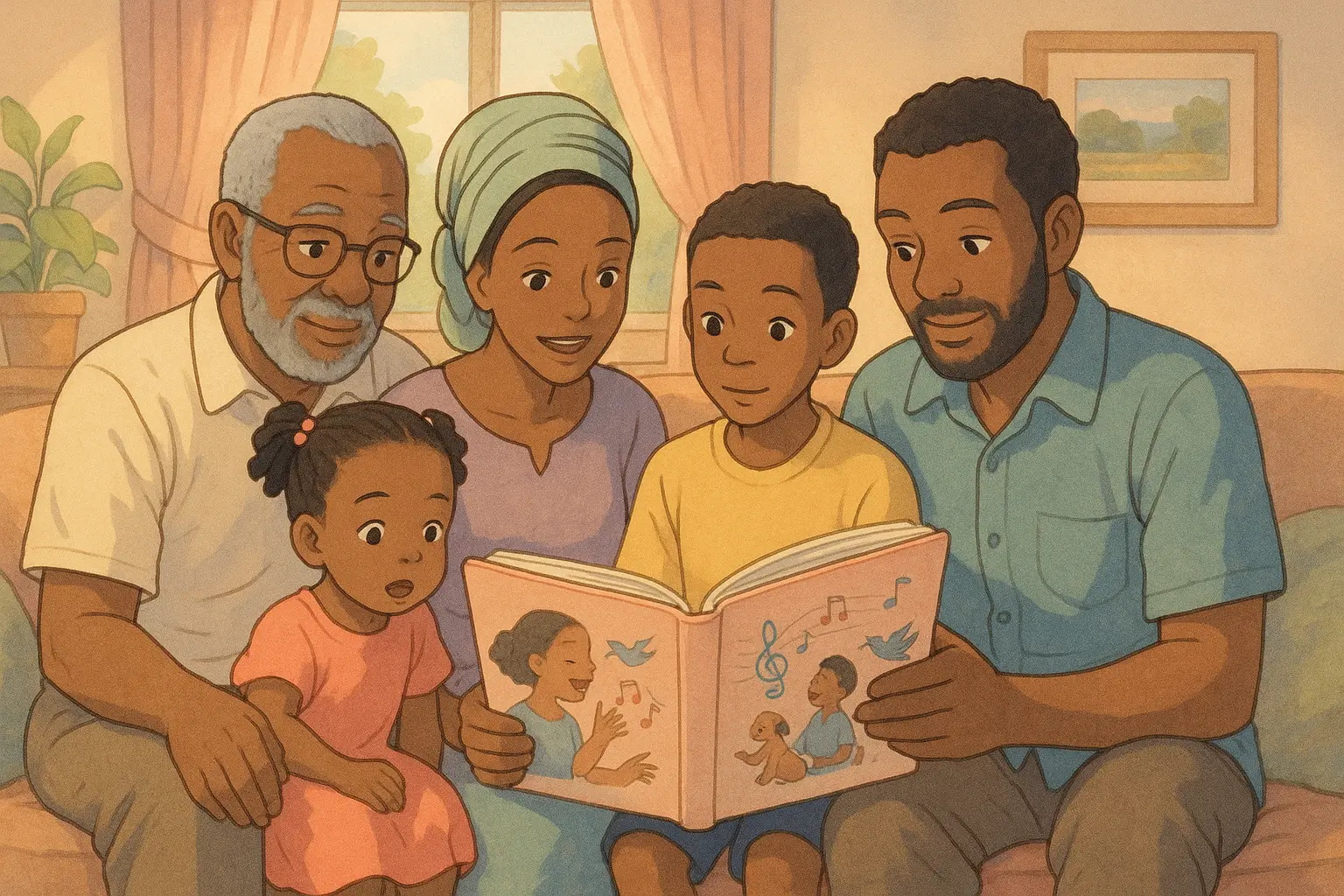Picture this: It's Saturday afternoon in your Atlanta home. The smell of jollof rice fills the air, and Miriam Makeba's "Pata Pata" plays in the background. Your kids, who were shy at first, are now dancing and trying to sing along, mixing English and African words. Sound familiar?
For many African families in America, music isn't just about entertainment – it's a bridge to our languages and culture. It's how we keep our heritage alive while embracing our new home. And the best part? Kids love it!
Let's explore how you can use music to help your children learn your language, from simple lullabies to modern songs they'll want to share with their friends.
Why Music Works So Well for Teaching Language
1. It's Natural and Fun
Kids don't even realize they're learning when they're singing. Think about it:
- They remember song lyrics better than vocabulary lists
- Music makes them want to move and participate
- They'll happily repeat songs over and over (even when you're tired of them!)
- Songs stick in their heads without effort
2. It Connects to Emotions
Music does something special that regular teaching can't:
- It creates happy memories with the language
- Kids associate the words with good feelings
- They feel proud when they can sing in your language
- It helps them feel connected to their culture
3. It's Easy to Share
You don't need to be a teacher or musician:
- You can sing while doing everyday things
- Family members can share their favorite songs
- You can find songs online or make up your own
- Even simple clapping games work
Starting with Simple Songs (Ages 0-5)
Lullabies and Nursery Rhymes
Begin with the basics:
- Sing the songs your parents sang to you
- Use simple counting songs
- Try finger-play rhymes
- Add actions to make it more fun
Quick Tip: Record grandparents singing traditional songs when they visit. Your kids can listen to these recordings anytime.
Make Daily Routines Musical
Turn everyday moments into learning chances:
- Sing a good morning song in your language
- Have a clean-up song
- Make up songs about what you're cooking
- Create a bedtime song routine
Easy Activity: Pick one daily task this week and create a simple song for it in your language.
First Words Through Songs
Help them learn basic words:
- Body parts ("Head, Shoulders, Knees and Toes" in your language)
- Numbers (counting songs)
- Animals (songs about different creatures)
- Family members (songs about family)
Growing with Music (Ages 6-12)
Moving to More Complex Songs
As your kids grow, their music taste will too:
- Add popular songs from your home country
- Try children's songs with more words
- Include songs that tell stories
- Mix languages in the same song
Making Music a Family Activity
Create special music moments:
- Have weekly family singing time
- Dance together to traditional music
- Let kids teach you their favorite songs
- Share stories about songs from your childhood
Using Technology Wisely
Make the most of modern tools:
- Create family playlists on streaming services
- Watch music videos from your home country
- Use music apps that feature African languages
- Record your own family versions of songs
Teenage Years: Keeping the Connection
Let Them Lead
Teenagers want independence, so:
- Ask them to find modern artists from your country
- Let them create playlists mixing cultures
- Respect their music choices
- Share the history behind songs they like
Making Cultural Connections
Help them see the bigger picture:
- Explain how modern songs connect to tradition
- Share music from different regions of Africa
- Discuss what song lyrics mean
- Connect music to current events
Building Pride
Use music to strengthen identity:
- Share success stories of African musicians
- Attend cultural music events together
- Encourage them to share their heritage through music
- Support their interest in learning instruments
Simple Ways to Start Today
Morning Routine
- Play music from your country during breakfast
- Sing simple greetings in your language
- Have a "song of the week" in both languages
Car Time
- Make special playlists for drives
- Take turns choosing songs
- Play language learning games with music
- Sing along together
Evening Time
- Have a short singing time before bed
- Share lullabies from your childhood
- Let kids make up their own songs
- Record special family moments
Look for These Resources:
- Local cultural centers with music programs
- Online videos of children's songs in your language
- Community events with traditional music
- Language learning apps that use music
Remember:
- You don't need to be a perfect singer
- Start with what you know
- Keep it fun and natural
- Celebrate small wins
Your Next Steps
-
Today: Choose one traditional song to share with your kids
-
This Week: Create a simple playlist mixing English and African songs
-
This Month: Start a regular family music time
-
This Year: Attend a cultural music event as a family
Final Thoughts
Using music to teach your children your language is one of the most natural and enjoyable ways to help them connect with their heritage. Don't worry about being perfect – your kids will love learning from you, no matter how well you sing!
Remember that every family's journey is different. Some kids might pick up songs quickly, while others take time. What matters is creating happy memories and keeping your culture alive through music.
Start small, be patient, and most importantly, have fun together. Your children might not realize it now, but the songs you share today will become treasured memories tomorrow, carrying your language and culture forward to the next generation.
Keep singing, keep sharing, and keep celebrating your heritage through music. Your children will thank you for it one day!
